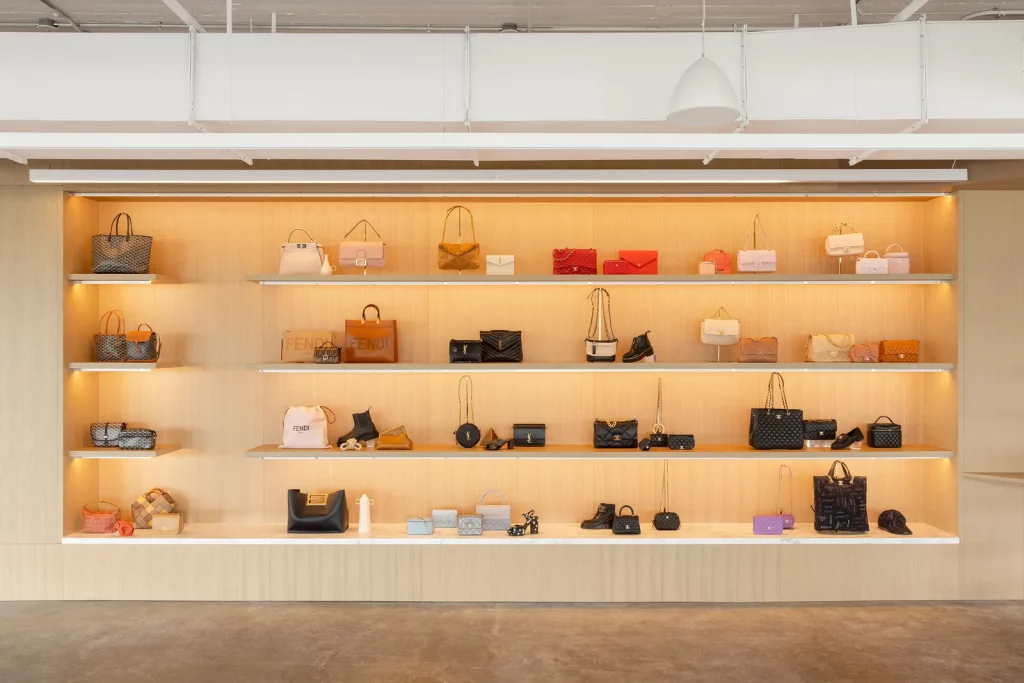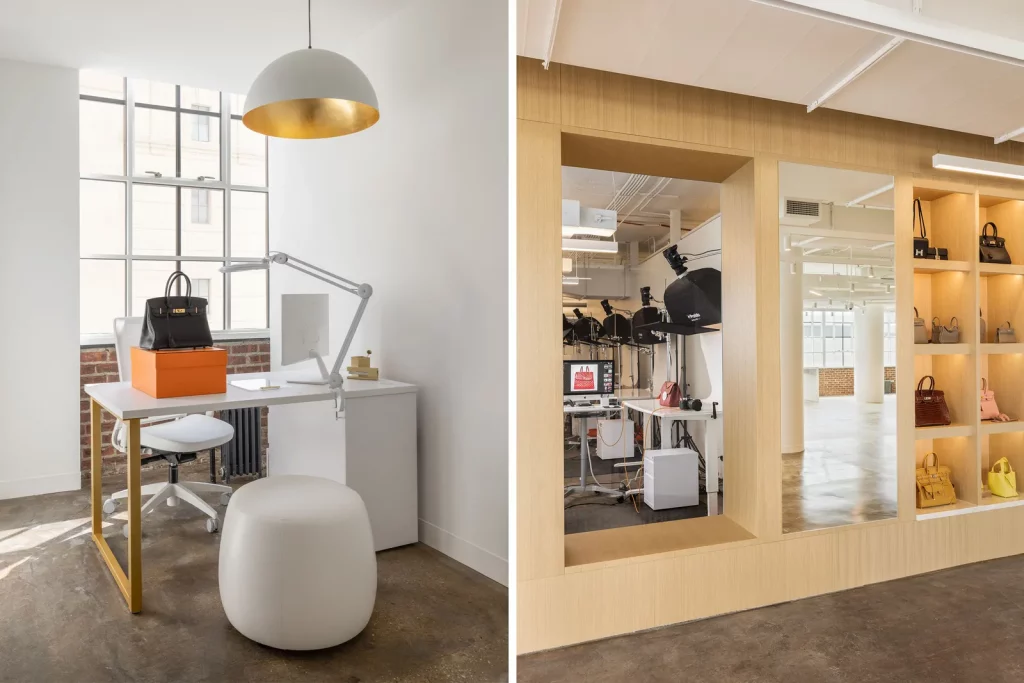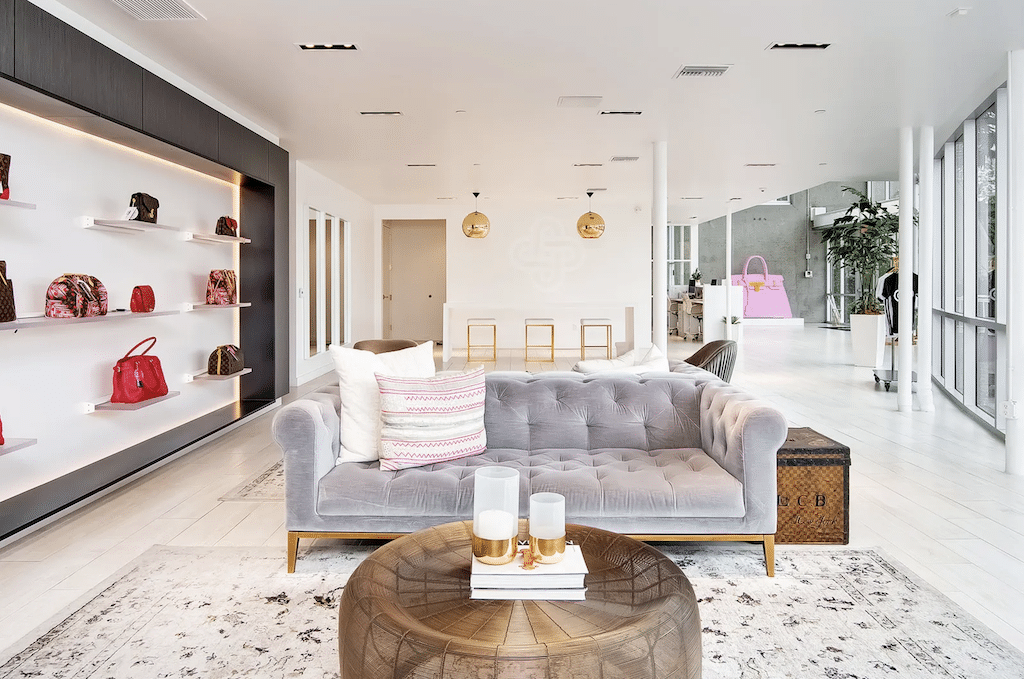Luxury resale company Fashionphile, known for its large collection of secondhand bags, leans into brick and mortar.
A Fashionphile pop-up is opening at Fred Segal Los Angeles, ahead of the holiday season. The California-based secondhand platform is the leader for pre-owned luxury handbags and accessories including Hermès, Chanel, and Louis Vuitton will host the po-up through the end of May.
The pop-up extends its retail presence following its exclusive partnership with Neiman Marcus. The retailer took a minority stake in the company in 2019—it now has ten Selling Studios Neiman Marcus stores across the U.S.
The event comes after announcing its first Manhattan location last spring in Chelsea, taking over a 60,000-square-foot space that the company says will offer handbags as well as luxury watches, among other accessories. The New York location will also offer a new light cleaning “Mini Spa” service in 2023.
Fashionphile says it has the largest collection of used Hermès Birkin bags in the world. The new showroom will also help the company increase its inventory and improve customer experience.
In-person resale studio
While Fashionphile is full immersed in the growing trend of secondhand resale platforms where the majority of sales happen online, Fashionphile has also prioritized its in-person studio selling. Consumers bring their gently used luxury accessories—mainly handbags—to the Fashionphile studios and sell the items on the spot where they have an optional gift card payment method. Customers who opt to be paid in Neiman Marcus gift cards enjoy a ten percent bonus on the gift card value.
That model has been successful for both brands; Neiman Marcus says it sees 100 percent redemption on the gift cards, with sales often going back into Fashionphile and total sales exceeding the gift card value by more than 2.5 times.

“This service is not only sustainable, it’s a key driver of customer experience and loyalty with our top spend clients — driving increased footfall and spend. We intend for recommerce and circularity services to play a role in our long term business and growth strategy,” president and CCO David Goubert, told Vogue Business.
In 2021, Fashionphile, which doesn’t disclose its sales, recorded between $450 million and $500 million in gross merchandise value — and it has been profitable since it launched as an eBay store in 1999. The average selling price of Fashionphile bags is $1,600. “We just don’t sell anything that’s not an ultra-luxury accessory,” Fashionphile founder Sarah Davis said.
Secondhand awareness
“Part of this puzzle is awareness. How do you get awareness to people who buy what we sell and sell what we buy — the truly ultra-luxury customer, buyer, aficionado? Chelsea is just one small part of that story. You’re going to see us so much more, building out awareness in different ways than you’re used to,” says Davis.
And while Fashionphile does prioritize the in-person selling, it also partnered with Christie’s New York online for the sale of rare and classic bags from Maisons including Hermès, Chanel, and Louis Vuitton among others, as part of Christie’s New York Luxury Week earlier this year.

It also works with Farfetch, offering a white-label platform that has been a value-add to the platform’s sustainability metrics as consumers increasingly seek out secondhand products.
The secondhand market, particularly luxury, is on an upward swing with platforms like luxury watch resaler WatchBox now valued at more than $1 billion. Leading the peer-to-peer selling is France-based B Corp The Vestiaire Collective, which just expanded its U.S. reach with the acquisition of Tradesy.
In its recent 2022 Ultra Luxury Resale Report, Fashionphile said it saw active shoppers increase 33 percent year on year, and older Millennials and Gen X consumers driving much of the demand.
“Gen Z may be busy dominating headlines, but Millennials and Gen X have been busy, too, quietly owning luxury re-commerce,” reads the 2022 Ultra Luxury Resale Report.
“In fact, the majority of our first-time shoppers are Millennials, who make up 45 percent of our new customers in 2022, followed by Gen X who make up 26 percent, Gen Z at 18 percent, and Boomers at 11 percent. Together these demographics look to resale to afford some of the most recognizable pieces from top luxury brands.”
The Fred Segal Fashionphile pop-up runs through May 31, 2023 at the Sunset store.
Related on Ethos:


